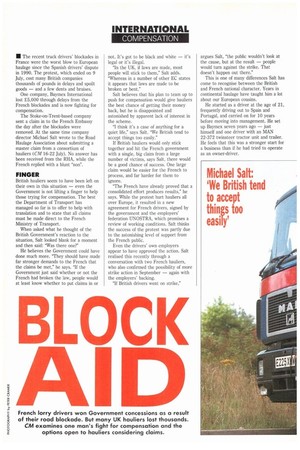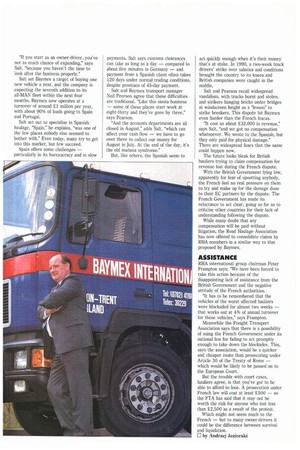: LO CK French lorry drivers won Government concessions as a result
Page 38

Page 39

If you've noticed an error in this article please click here to report it so we can fix it.
of their road blockade. But many UK hauliers lost thousands. CM examines one man's fight for compensation and the options open to hauliers considering claims.
• The recent truck drivers' blockades in France were the worst blow to European haulage since the Spanish drivers' dispute in 1990. The protest, which ended on 9 July, cost many British companies thousands of pounds in delays and spoilt goods — and a few dents and bruises.
One company, Baymex International lost £5,000 through delays from the French blockades and is now fighting for compensation.
The Stoke-on-Trent-based company sent a claim in to the French Embassy the day after the blockades were removed. At the same time company director Michael Salt wrote to the Road Haulage Association about submitting a master claim from a consortium of hauliers (CM 16-22 July). No answer has been received from the RHA, while the French replied with a blunt "non".
FINGER
British hauliers seem to have been left on their own in this situation — even the Government is not lifting a finger to help those trying for compensation. The best the Department of Transport has managed so far is to offer to help with translation and to state that all claims must be made direct to the French Ministry of Transport.
When asked what he thought of the British Government's reaction to the situation, Salt looked blank for a moment and then said: "Was there one?"
He believes the Government could have done much more. "They should have made far stronger demands to the French that the claims be met," he says. "If the Government just said whether or not the French had broken the law, people would at least know whether to put claims in or not. It's got to be black and white — it's legal or it's illegal.
"In the UK, if laws are made, most people will stick to them," Salt adds. "Whereas in a number of other EC states it appears that laws are made to be broken or bent."
Salt believes that his plan to team up to push for compensation would give hauliers the best chance of getting their money back, but he is disappointed and astonished by apparent lack of interest in the scheme.
"I think it's a case of anything for a quiet life," says Salt. "We British tend to accept things too easily."
If British hauliers would only stick together and hit the French government with a single, big claim from a large number of victims, says Salt, there would be a good chance of success. One large claim would be easier for the French to process, and far harder for them to ignore.
"The French have already proved that a consolidated effort produces results," he says. While the protest hurt hauliers all over Europe, it resulted in a new agreement for French drivers, signed by the government and the employers' federation UNOSTRA, which promises a review of working conditions. Salt thinks the success of the protest was partly due to the astonishing level of support from the French public.
Even the drivers' own employers appear to have approved the action. Salt realised this recently through a conversation with two French hauliers, who also confirmed the possibility of more strike action in September — again with the employers' backing.
"If British drivers went on strike," argues Salt, "the public wouldn't look at the cause, but at the result — people would turn against the strike. That doesn't happen out there."
This is one of many differences Salt has come to recognise between the British and French national character. Years in continental haulage have taught him a lot about our European cousins.
He started as a driver at the age of 21, frequently driving out to Spain and Portugal, and carried on for 10 years before moving into management. He set up Baymex seven years ago — just himself and one driver with an MAN 22-372 twinsteer tractor unit and trailer. He feels that this was a stronger start for a business than if he had tried to operate as an owner-driver. "If you start as an owner-driver, you've not as much chance of expanding," says Salt, "because you haven't the time to look after the business properly."
Salt set Baymex a target of buying one new vehicle a year, and the company is expecting the seventh addition to its all-MAN fleet within the next four months. Baymex now operates at a turnover of around £.1 million per year, with about 90% of loads going to Spain and Portugal.
Salt set out to specialise in Spanish haulage. "Spain," he explains, "was one of the few places nobody else seemed to bother with." Even today, many try to get into this market, but few succeed.
Spain offers some challenges — particularly in its bureaucracy and in slow payments. Salt says customs clearances can take as long as a day — compared to about five minutes in Germany — and payment from a Spanish client often takes 120 days under normal trading conditions, despite promises of 45-day payment.
Salt and Baymex transport manager Neil Pearson agree that these difficulties are traditional. "Like this siesta business — some of these places start work at eight-thirty and they're gone by three," says Pearson.
"And the accounts departments are all closed in August," adds Salt, "which can affect your cash flow — we have to go over there to collect our money for August in July. At the end of the day, it's the old matiana syndrome."
But, like others, the Spanish seem to act quickly enough when it's their money that's at stake. In 1990, a two-week truck drivers' strike over salaries and conditions brought the country to its knees and British companies were caught in the middle.
Salt and Pearson recall widespread vandalism, with trucks burnt and stolen, and strikers hanging bricks under bridges at windscreen height as a lesson" to strike breakers. This dispute hit Baymex even harder than the French fracas.
"It cost us about £32,000 in revenue," says Salt, 'and we got no compensation whatsoever. We wrote to the Spanish, but they only paid for physical damage." There are widespread fears that the same could happen now.
The future looks bleak for British hauliers trying to claim compensation for revenue lost during the French dispute.
With the British Government lying low, apparently for fear of upsetting anybody, the French feel no real pressure on them to try and make up for the damage done to their EC partners by the dispute. The French Government has made its reluctance to act clear, going so far as to criticise other countries for their lack of understanding following the dispute.
While many doubt that any compensation will be paid without litigation, the Road Haulage Association has now offered to consolidate claims by RHA members in a similar way to that proposed by Baymex.
ASSISTANCE
RHA international group chairman Peter Frampton says: "We have been forced to take this action because of the disappointing lack of assistance from the British Government and the negative attitude of the French authorities.
"It has to be remembered that the vehicles of the worst affected hauliers were blockaded for almost two weeks — that works out at 4% of annual turnover for these vehicles," says Frampton.
Meanwhile the Freight Transport Association says that there is a possibility of suing the French Government under its national law for failing to act promptly enough to take down the blockades. This, says the association, would be a quicker and cheaper route than prosecuting under Article 30 of the Treaty of Rome — which would be likely to be passed on to the European Court.
But the trouble with court cases, hauliers agree, is that you've got to be able to afford to lose. A prosecution under French law will cost at least £500 — so the FTA has said that it may not be worth the risk for anyone who lost less than £2,500 as a result of the protest.
Which might not seem much to the French — but to many owner-drivers it could be the difference between survival and liquidation.
by Andrzej Jeziorski












































































